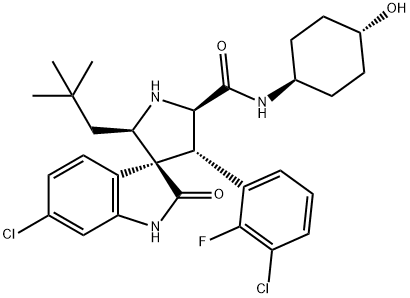1303607-07-9
 1303607-07-9 結(jié)構(gòu)式
1303607-07-9 結(jié)構(gòu)式
基本信息
(2'R,3S,4'S,5'R)-6-Chloro-4'-(3-chloro-2-fluorophenyl)-N-((1r,4R)-4-hydroxycyclohexyl)-2'-neop
(2'R,3S,3'S,5'R)-6-chloro-3'-(3-chloro-2-fluorophenyl)-5'-(2,2-dimethylpropyl)-N-(4-hydroxycyclohexyl)-2-oxospiro[1H-indole-3,4'-pyrrolidine]-2'-carboxamide
(2'R,3S,4'S,5'R)-6-Chloro-4'-(3-chloro-2-fluorophenyl)-2'-(2,2-dimethylpropyl)-1,2-dihydro-N-(trans-4-hydroxycyclohexyl)-2-oxospiro[3H-indole-3,3'-pyrrolidine]-5'-carboxamide
Spiro[3H-indole-3,3′-pyrrolidine]-5′-carboxamide, 6-chloro-4′-(3-chloro-2-fluorophenyl)-2′-(2,2-dimethylpropyl)-1,2-dihydro-N-(trans-4-hydroxycyclohexyl)-2-oxo-, (2′R,3S,4′S,5′R)-
物理化學(xué)性質(zhì)
常見問題列表
Ki: 0.88 nM (MDM2)
MI-773 potently induces expression of p53 and its downstream targets p21, MDM2, and induces phosphorylation of p53 (serine 392) in low passage primary human ACC cells. Notably, MI-773 induces a dose-dependent increase in the fraction of apoptotic ACC cells and in the fraction of cells in the G1 phase of cell cycle (P<0.05). Consequently, MI-773 causes apoptotic cell death. MI-773 is an advanced synthetic small molecule inhibitor, displays high binding affinity against MDM2 (K d =8.2 nM).
MI-773 at 10 mg/kg modestly reduces the rate of tumor growth, whereas 100 mg/kg causes significant tumor regression. Control tumors reach an average of 1,000 mm 3 at 20 days of treatment, compare to an average volume of 600 mm 3 for the 10 mg/kg group and 30 mm 3 for the 100 mg/kg group. Kaplan-Meier analysis shows an increase in tumor failure, define as two times increase in tumor volume as compared to pretreatment volume (P=0.044), for vehicle-treated mice when compare to mice treated with 100 mg/kg MI-773.
